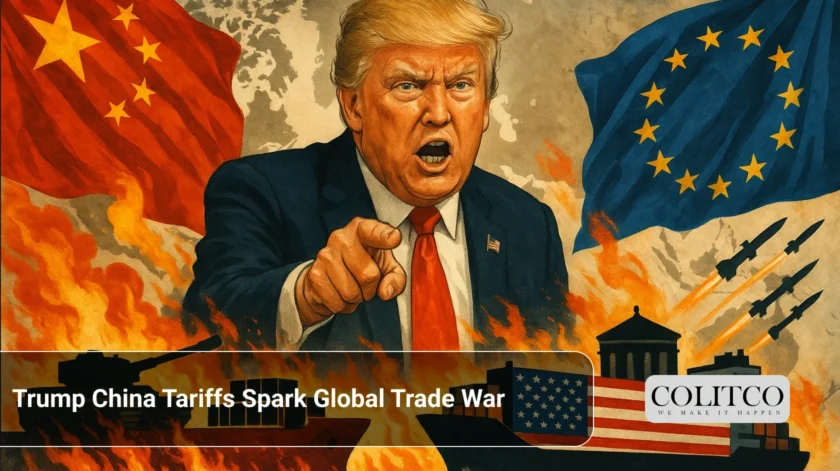President Donald Trump has once again put the world’s trade to the test by imposing an extraordinary tariff of 130% on Chinese goods, which sent reverberations across the global stock markets. This action is seen as a drastic step back after a period of relative peace between Washington and Beijing for several months.

Trump’s 130% China tariffs reignite global trade tensions and uncertainty
What Prompted Trump’s Sudden Tariff Surge?
The American president announced that the U.S. government would levy an additional 100% tariff on imports from China, in addition to the existing 30% tariff. The new restrictions will kick off on or about November 1, together with the critical software’s export controls.
Trump’s explanation states that the move is a reaction to China’s increasingly strict measures that have cut down the export of rare metals, which are a major component in electronics manufacturing.
Trump not only expressed his displeasure through this action by canceling his planned meeting with the Chinese President Xi Jinping in South Korea, which was set for the end of this month.
Markets React As Trade Fears Resurface
The news was received with alarm by the global investors, and they reacted very quickly. The Dow Jones Industrial Average was down 878 points or 1.9%, the S&P 500 was down 2.7% and the Nasdaq was down 3.5%, which indicated a very deep concern in the tech sector.
The markets are fearing that the situation may again get out of control as it did in the spring of 2025, when the tariffs were raised to as high as 145% and a global selloff was triggered. The Derivatives Market has already reacted by decreasing the Fear & Greed Index to 29, which means that the traders are becoming more and more anxious.
He has made past threats that did not always come true, but traders are still on the safe side. The mere fact of being uncertain as to what his next move will be can destroy economic confidence and disrupt the global supply chains.

How Dependent Are The US And China On Each Other?
The economies of the United States and China are still the largest in the world. Although Mexico has become America’s leading source of imports, China is still the supplier of goods worth hundreds of billions of dollars. US imports from China mainly consist of electronics, apparel, and furniture.
Furthermore, China is one of the biggest markets for US exports. The heavy economic interdependence of the two countries is the reason why every tariff announcement is economically significant. The Trump government encouraged companies to move their manufacturing facilities back to the US, although most of them still depend on foreign production.
In the previous escalation of trade wars, Trump declared 145% tariffs, which practically stopped cotton coming from China. Then, his administration extended an exemption to electronics, resulting in a 20% tariff, which was a concession to avoid further economic suffering.
Trade Truce And Fragile Cooperation Collapse
In May 2025, the two countries seemed to relax their tensions. China lifted the tariffs on American goods to 10% from 125%, and the US decreased the tariffs by half, that is, to 30% from 145%. The thaw in relations was a momentary lift for both stock markets.
On the other hand, the announcement made on Friday broke that fragile peace. Trump stated that China’s “hostility came out of nowhere,” but the quarrels had been going on for several months. Restrictions placed by Beijing on rare earths, which are vital for electric vehicles and defence technology, were a major reason for the US to lose patience over the supply stability issue.
The US had already retaliated by putting a limit on sales of Nvidia’s AI chips to China and later loosening those restrictions. However, the cycle of retaliation has continued, leading to deeper mistrust.
Why Are Rare Earths Central To The Conflict?
Modern manufacturing heavily relies on rare earth elements, from cell phones to missiles. China has the largest share of the world supply. The US considers the situation a national security risk and has been trying to get independent sources of supply as a result.
The new export limitations that China put in place in September caused a resurgence of worries about dependence on technology. Trump’s most recent tariff announcement is associated with this concern. He cautioned that the US would not permit China to “turn into a weapon resource essential for American industry.”

China’s rare earth dominance raises major US national security concerns
What Comes Next For The Trade Battle?
Analysts are of the opinion that Trump’s power play might be restricted by law. The Supreme Court’s ruling next month will be decisive on the president’s power to decide tariffs without anyone’s consent. This ruling will, if it is against the president, limit future tariff actions.
Both economies are now in a situation of increased uncertainty. Higher prices on imported goods might be the result for American consumers, while the opposite is true for the Chinese exporters, who might lose their market.
Market strategists warn that a renewed US-China trade war may slow the global economy. This could threaten the fragile post-pandemic recovery. China may retaliate by raising tariffs or tightening trade conditions.
The situation is quite tricky as there is still no clear winner; whether Trump’s tariff gamble will strengthen America’s industrial base or will it spread global instability deeper.
Also Read: Trump Warns Australia of $2.2 Billion Tariffs on Key Exports
FAQs
- What are Trump’s new China tariffs?
Trump raised the tariff on Chinese imports by an additional 100%, which would be in addition to the current 30% tariff.
- When do the new tariffs take effect?
They are going to start on or before the 1st of November, 2025.
- How did markets react to the announcement?
The US stock market crashed, with the Dow down 878 points, a fall of 2.7% for the S&P 500, and a drop of 3.5% for the Nasdaq.
- Why are rare earths central to the dispute?
China has the upper hand in the rare earth supply chain. The US uses these materials in making electronic and military technologies.












